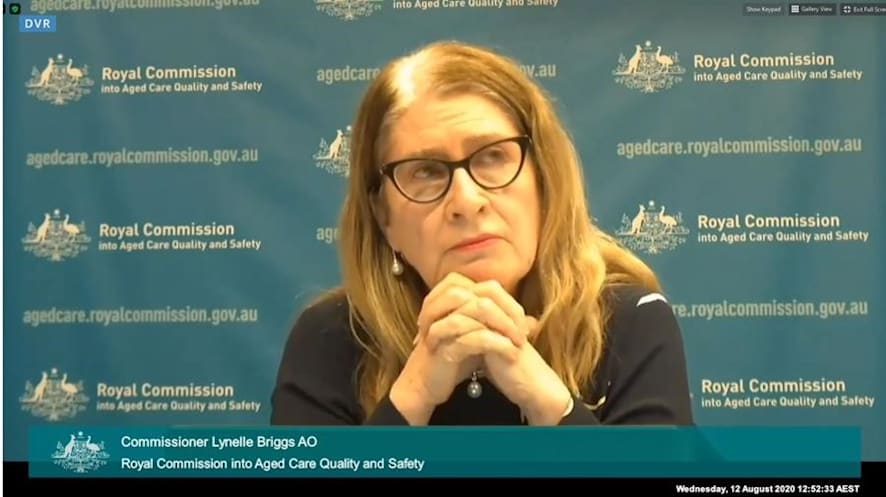Dr Nigel Lyons, NSW Health’s Deputy Secretary for Health System Strategy and Planning, has denied the decision to keep infected residents in the Anglicare home was because the authorities didn’t want to create a precedent that all aged care residents that tested positive for COVID were hospitalised.
Senior Counsel Assisting Peter Rozen QC brought Dr Lyons’ attention to a Department of Health email from a 16 April meeting – five days into the outbreak – that recorded NSW Health’s preference to “not to decant residents into hospitals given the precedent this would set.”
“Need to find solutions that enable appropriate care to be provided in the facility,” Mr Rozen read out. “Looking at hospital-in-the-home and in-reach palliative care if needed.”
“My question to you is: is the reference to a precedent that would be set if residents were decanted to hospitals accurate?”
Decision to keep infected residents at Newmarch based on medical advice
Dr Lyons said the decision was made on infectious diseases specialist Dr James Branley’s advice that residents – both positive and negative – should stay in place.
“The strong advice we had was that at this point in the outbreak was very difficult to actually know who was, you knew who was COVID positive because they had had a COVID positive test but you couldn’t with definitive know people [were] COVID negative because it may be they were still incubating the virus and with the extent of exposure that had occurred over a period of days, it was Dr Branley’s view that there were many other residents who will ultimately become COVID positive,” he replied.
Senior Counsel expresses doubt
The Senior Counsel questioned this response however, because that would likely be the case in any aged care outbreak.
“If you wait until everyone who is going to be tested tests positive, you potentially lose control of the outbreak in the facility, don’t you?” he asked.
The Deputy Secretary also dismissed the Counsel Assisting’s agreement that transferring COVID positive residents to hospital in situations where a facility is struggling to retain staff and manage an outbreak could be of assistance.
“It may be, but I would say this that it of itself doesn’t necessarily lead to a difference,” he said. “We debated this at some length in relation to the response of Newmarch. It doesn’t actually take away the need for appropriate use of personal protective equipment for few and control cohorting, all the things that need to be done to prevent the spread need to be in place and continue, because as we have indicated there could well be other residents who have not yet declared their COVID positive status but are actually infected.”
NSW Health defends lack of written agreement for Hospital in the Home
Dr Lyons also defended the lack of a written agreement for Newmarch House’s ‘Hospital in the Home’ program, saying there was an existing relationship in place and the parties involved would have known their roles and responsibilities.
However, he could not say if Newmarch staff had received the training on ‘Hospital in the Home’ that is also part of the guidelines, taking the question on notice.
Either way, the Senior Counsel was clearly unimpressed with the ‘failure’ of NSW Health to ensure those guidelines were adopted at Newmarch.
“I suggest, doctor, that for hospital-in-the-home to work in the residential aged care facility in response to the COVID-19 pandemic, you have to have everything in place: the agreement, the training, the facilities, to have any chance of succeeding. You’ve got to do all that, don’t you?” he asked pointedly.
Secretary says program based on ongoing assessment
Dr Lyons didn’t refute this assessment – but said the program is not a “set and forget”.
“While we admitted people in the hospital-in-the-home program it didn’t preclude based on their clinical condition them being subsequently admitted to the hospital. In fact, many of the residents were admitted to hospital. So, it’s an ongoing assessment.”
Commissioner Briggs asks where tipping point is
“There’s a tipping point, isn’t there, where it becomes out of control and quite dangerous to the health of people, both staff and residents, in a facility,” she remarked.
“And so I suppose my question is: do you want to give some counsel or advice to us about where that tipping point is obvious and people do need to be transferred into hospital, or who should be taking those decisions about those transfers, given the important role that NSW Health has played in this pandemic management arrangement?”
Dr Lyons said his experience at Newmarch House was the need for ongoing reviews, which they held with input from all involved twice a week during the height of the pandemic.
“We had a lot of discussion about ‘are we at a point where we need to decant?’” he said. “Do we need to take further measures? We even talked about, other aged care providers taking some residents. We talked about options around private hospitals taking some of the residents. But it always came back to the advice that the people on the ground in particular, the clinicians caring and in this situation Dr Branley had a lot of advice for us about what was appropriate to do and whether or not we should take further action. But it was a constant assessment.”
The Commissioner looked like the question was still unresolved for her.










